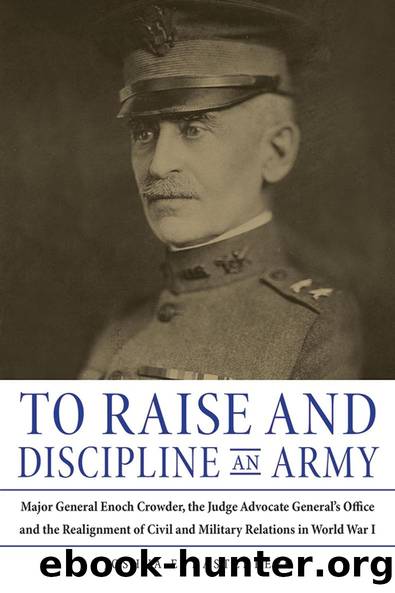To Raise and Discipline an Army by Joshua Kastenberg

Author:Joshua Kastenberg [Kastenberg, Joshua]
Language: eng
Format: epub
Tags: History, Military, United States, 20th Century
ISBN: 9781609092139
Google: mq68DwAAQBAJ
Publisher: Cornell University Press
Published: 2017-04-15T01:11:01+00:00
THE JUDGE ADVOCATE GENERALâS OFFICE, CONGRESS, AND NEUROLOGY
Prior to the war, insanity was accepted as a defense to criminal conduct in courts-martial, and in some instances, soldiers who became delusional were allowed to retire or were hospitalized in federal and state hospitals. In 1859 Congressman Daniel Sickles, who was later to achieve notoriety as a Union general, was acquitted of murder on the basis of temporary insanity. At the time of his trial in a New York civil court, Sickles had no connection to the army, but within three years of his trial, he commanded a corps in the Army of the Potomac as a major general. Perhaps because his defense counsel was future secretary of war Edward Stanton, the War Department later recognized insanity as a bona fide medical condition. In 1884 the War Department permitted General Ranald MacKenzie, a Civil War veteran and famed Indian fighter, to retire from the army after he became delusional. Until World War I, the legal test for determining insanity was based on proving that the accused soldier suffered from âan irresistible impulseâ to commit an offense and that the accused soldier could not comprehend the wrongness of his acts. Although insanity was an accepted defense against criminal liability, soldiers who claimed insanity were usually unsuccessful in avoiding a conviction and imprisonment.
Crowder, Ansell, and the judge advocates assigned to the Judge Advocate Generalâs Office were attuned to advances in psychiatry, and with the addition of judge advocates who came into the army after serving as state judges, federal prosecutors, or professors of law, the Judge Advocate Generalâs Office accepted that the rigors of modern warfare would cause a fraction of the soldiers sent into battle to become unable to function. They also collectively realized that congressional oversight over military discipline might be at its most vigorous in the armyâs treatment of persons suffering from âshell-shockâ or other warfare-caused neurosis. In 1917 Crowder informed Baker that from a military law standpoint, there were no impediments to placing psychiatrists throughout the American Expeditionary Forces in positions commensurate with the status of surgeons. He also added that the courts-martial of soldiers determined to be unfit for duty without the protection of a psychiatric diagnosis would undermine Congressâs confidence in the fairness of courts-martial.36
In 1914 Congressman Andrew R. Brodbeck asked Secretary of War Garrison to move a Private Lisle Crabtree from the Government Hospital for the Insane in Washington, DC, to a Pennsylvania state hospital so that his mother could attend to him. Crabtreeâs offenses were serious. A court-martial convicted him of murder and assault and sentenced him to life in prison after he shot two officers at Fort Leavenworth and killed his commanding officer âwithout provocation.â Crowder responded to Garrison that a medical investigation determined Crabtree was sane at the time of the offenses, but in prison he had become dangerously delusional and would commit a violent offense if he gained his liberty. Moreover, after reviewing Pennsylvaniaâs state laws, Crowder concluded that the state hospital was
Download
This site does not store any files on its server. We only index and link to content provided by other sites. Please contact the content providers to delete copyright contents if any and email us, we'll remove relevant links or contents immediately.
Tor and the Dark Net · Remain Anonymous Online and Evade NSA Spying (Tor, Dark Net, Anonymous Online, NSA Spying) by Smith James(206)
The Love Conspiracy: An Age-Gap Lesbian Romance by Arias J.J(169)
Carl Schmitt Between Technological Rationality and Theology by Hugo E. Herrera;(158)
If We Burn by Vincent Bevins(150)
Women before the court by Lindsay R. Moore(121)
Witches, Wife Beaters, and Whores by Elaine Forman Crane(106)
Covering Muslims by Erik Bleich;A. Maurits van der Veen;(105)
Defensive Nationalism by B. S. Rabinowitz;(105)
The Crimes of Womanhood by A. Cheree Carlson(103)
The Will to Punish by Fassin Didier;Kutz Christopher;(101)
Sexual Violence in Conflict and Post-Conflict Societies by unknow(99)
Defining Girlhood in India by Ashwini Tambe(99)
To Raise and Discipline an Army by Joshua Kastenberg(97)
Critique of the Legal Order by Richard Quinney Randall G. Shelden(96)
Police Matters by Radha Kumar(92)
International Humanitarian Law and Justice by Mats Deland Mark Klamberg Pål Wrange(91)
A New Daddy by orphan_account(91)
Advisory Boards in Medium-Sized Companies by Daniel Graewe(87)
History and Power in the Study of Law by June Starr Jane F. Collier(85)
